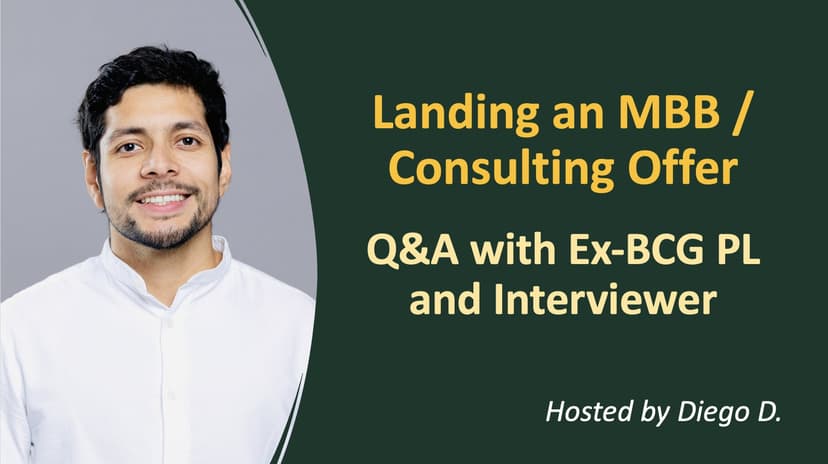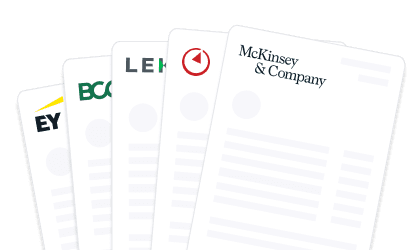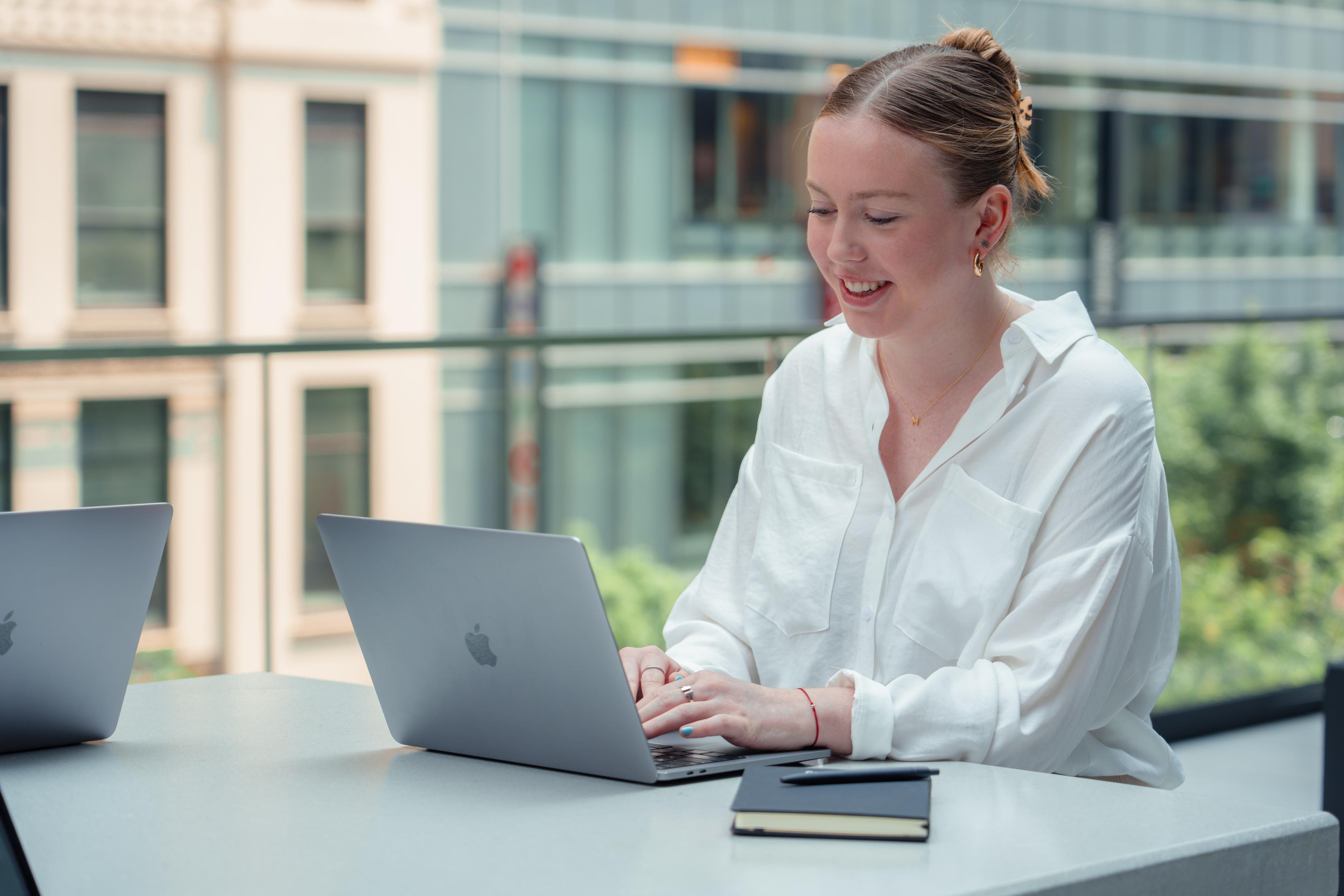What MBBs Are Looking For
From No Offers to Multiple Offers–How to Take Your Casing to the Next Level
Tips for management consulting case interviews that got one applicant several job offers at MBB and other top firms.

By Brigham S.
McKinsey consultant and MBB guru
Posted June 13, 2025

Join a free event
Learn from top coaches and industry experts in live, interactive sessions you can join for free.
Table of Contents
Hi, I’m Brigham S., a Management Consulting Coach on Leland and MBB Guru. When I first went through the consulting recruiting process, I didn’t land a single offer. The next year, I landed multiple. I cracked down on case prep and learned what it takes to succeed. I’ve since coached dozens of applicants to MBB offers, and I’d love to help you break into the field! To work with me on any part of the consulting recruiting or application processes, book a free intro call on my profile to get started!
It was the junior year of my undergrad and I had just found out I landed first-round interviews at McKinsey, Bain, and BCG. I was ecstatic. I was also terrified.
I had connected with countless school alumni that were already at each of these firms and knew that getting an interview was only the first hurdle. Everyone had told me that consulting was a ‘crapshoot’ and that despite one’s best efforts, there are a number of external factors that make it so that even the top candidates don’t always get offers.
When the interviews finally rolled around, I felt that I had done everything I could to prepare up to that point. I had practiced my fit/personal experience stories. I had solid connections at each of the firms. I had cased… a lot, but there was still this nagging doubt in the back of my mind that my casing was not as strong as it needed to be.
Long story short, I ended up offer-less at the end of a long and emotionally draining recruiting cycle. To say I was devastated is an understatement. I had put school, my social life, and even my family on the backburner; I invested everything into getting an offer and had nothing to show for it.
Fast forward eight months to the summer before my senior year. I had taken several months off and had just tried to enjoy life, concentrate on school, invest in my social life and family, and have fun. I was in a great spot mentally and I knew it was time to pick up where I left off with my casing and dive headfirst into prep. I was NOT going to let last year repeat itself.
This time I created a detailed plan. I knew what my weak points were, and I focused all my attention on turning those weaknesses into strengths. I stumbled upon a few resources online that were perfect for me. I spent hours casing, reworking those cases, and doing drill after drill. By the end of the summer, I felt much more confident in my casing ability.
I again landed interviews at all three of my target firms – McKinsey, Bain, and BCG. I had interviews with BCG first and found out I was moving on to the final rounds. My Bain interview came the following week and I had McKinsey first-rounds the next day. I interviewed with Bain on a Tuesday and McKinsey on a Wednesday. I found out I was moving on from both and they scheduled my McKinsey final rounds for the next day – Thursday. About two hours after my interviews, I got the call from the McKinsey partner that I got the offer.
The feeling of relief and excitement was beyond words. It was one of the most surreal moments of my life. All the hard work, all the time and preparation, all the sacrifice culminating into that one moment of joy – truly indescribable. My final rounds with Bain and BCG were the next day, that Friday. It was insane. I felt so confident going into my final rounds at Bain that I had the best interview of my life. I knew for certain that I had gotten the Bain offer. My Bain interview ended up going long and I was late for my BCG interview (which I don’t recommend). Needless to say, I didn’t get the BCG offer.
Reflecting on my experience, I found that there are 4 key factors that can make you stand out in the case interview. These are things that I focused on during my senior year of prep that, I think, made all the difference.
1. Create a solid structure
Creating a structure for how you will approach each case problem is the first major step. This is also where you make your first real impression. Making a killer, unique structure can wow the interviewer right off the bat. On the flip side, pulling out a generic or canned framework shows the interviewer that you are just another one of those cases.
Don’t be afraid to use a matrix and get really creative on how you approach the problem. Tailor your structure to what you are solving and use the right verbiage in each of your buckets. Come up with unique categories but do not leave out the essential ones either. Be very clear in how you explain your structure and make sure to signpost. When you are brainstorming at other parts of the case, structure your thoughts. This is arguably the most important part of the entire case.
2. Contextualize your math
This is another area that is easy to ‘spike’ in (meaning an area where you can differentiate yourself from other candidates). While being a math wizard is a great attribute, I’m talking about much more than just getting to the right answer. Don’t get me wrong, you have to get to the right answer. But once you do, contextualize it. What is the answer telling you about the case problem? Gut check it and make sure that it makes sense given the context of the case.
For example, if you are looking at potentially acquiring an ice cream business, and the profit margin ends up being ~20%, what are you going to do with that number? Would you compare it to other ice cream shops to make sure it’s accurate? Does that seem too high or too low? Are there other parties interested in this deal because of the high profit margin?
Take your answer and go two steps further with it. Don’t be afraid to do a little extra quick math either (i.e., if you get to $10M as an ‘answer’, plug it back in and find out what % that is. Do some additional calculations that others wouldn’t think to do). Think about the problem from multiple angles and contextualize your math, and in doing so, show the “so, what?” of the case.
3. Say more with less
This is a catchphrase that I would repeat in my head constantly. What do I mean by this? Don’t over-explain. In other words, don’t take five minutes to explain something that can be explained in two sentences. Be clear, concise, and articulate, and don’t just use words to fill up time or sound verbose.
That doesn’t mean you have to sound like a robot. There is a happy balance between sounding like a robot and speaking clearly and articulating your thoughts well. Practice this in your everyday conversations. Practice signposting (there are 3 things that come to mind: the first is blank, the second is blank, and the third is blank). This is even more important when you are interviewing virtually – you have to be clear and help the interviewer understand what you’re saying.
4. Add personality
Don’t try and be what you think the firms or the interviewer want you to be; just be you. Show your authentic self and unique personality and let that come through in the interview and in the case. Don’t force it, just let it be natural. I understand this is much easier said than done, as it was something I struggled with as well. But don’t underestimate the power of confidence. Be confident in the prep you put in, in your casing ability, in your personal stories, and in what makes you unique.
In my first rounds with Bain, the interviewer had my resume and saw that I was a diehard Survivor fan. She asked me questions about my application to be on the show and different things about the series. We both laughed and had a great side conversation before getting into the case. It’s such a simple thing but can make all the difference in whether or not you move on or get the offer. Get them to like you.
I have only one last piece of advice: don’t take yourself too seriously. If you make a mistake, acknowledge it and laugh it off. You don’t need to be perfect. With the right balance of personality and a solid structure, you can make up for a small math error. Just be you and do your best, good luck!
Final Note
The consulting application process can be stressful, disappointing, and time-consuming. Trust me, I know. However, with the right help and guidance, you can improve your odds of success and have more fun. If you’d like personalized advice on breaking into consulting, please reach out to me. I’d love to work with you and help you accomplish your goals. Book a free intro call on my profile to chat and see how we could work together.
Here are some other articles you may find helpful:

Written by Brigham
5.0
(3)
Hi, I'm Brigham. I'm a proud father to two little girls, an avid golfer (though, I admittedly haven't golfed under a clean 85. It's an emotional journey), and I'm low-key obsessed with Olivia Rodrigo. Not ashamed. From my experience going through the interview process during undergrad and helping others break into consulting, I've learned the ins and outs of what it takes to get an offer. This was my experience: I interviewed at Bain, BCG, and McKinsey my junior year but didn't make it past final rounds. I was pretty devastated. I realized I wasn't taking the process serious enough and the next year I cracked down on case prep. My senior year I ended up getting offers from McKinsey, Bain, and going to final rounds with BCG. I know how to create a rock-solid resume and craft the resume to help you stand out as an applicant (I landed interviews at all three firms both times I applied). I learned what it takes to get an offer from top consulting firms and what they are looking for in candidates. I learned how to take my casing to the next level in order to land multiple offers. I have coached dozens of candidates and helped them land offers at McKinsey, Bain, and BCG. ** I went through the application process in a virtual environment and can speak to tips that can enable you to stand out and differentiate yourself despite not being physically present for your interview. Can't wait to help you break into consulting!
Brigham has helped clients get into organizations like:





























